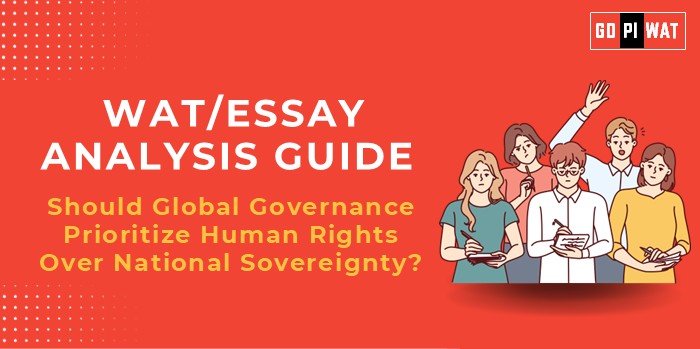📋 Written Ability Test (WAT)/Essay Analysis Guide
🌍 Topic: Should Global Governance Prioritize Human Rights Over National Sovereignty?
📖 Understanding the Topic’s Importance
💡 This topic reflects the ethical and practical dilemmas of global governance. It is especially relevant in an era marked by transnational issues like migration, climate change, and authoritarianism.
🕒 Effective Planning and Writing
- ⏱️ Time Allocation (30 minutes):
- Planning: 5 minutes
- Writing: 20 minutes
- Review: 5 minutes
✍️ Introduction Techniques for Essays
- ⚖️ Contrast Approach:
“While sovereignty ensures a nation’s autonomy, human rights transcend borders, posing a complex dilemma for global governance.”
- 💡 Solution-Based Introduction:
“Balancing sovereignty and human rights is essential to build a peaceful, equitable world.”
📚 Structuring the Essay Body
- 🏆 Achievements:
Discuss the R2P framework, ICC, and successful UN interventions like in Sierra Leone.
- ⚠️ Challenges:
Highlight sovereignty conflicts, enforcement gaps, and political biases.
- 🌏 Future Outlook:
Emphasize multilateral consensus, equitable frameworks, and digital tools to monitor rights.
🔑 Concluding Effectively
- ⚖️ Balanced Approach:
“The synergy between sovereignty and human rights is vital. A multilateral framework that respects both principles can ensure ethical global governance.”
- 🌍 Global Comparison:
“Learning from Rwanda’s failures and Kosovo’s successes, the world must navigate the balance between these competing priorities.”
📄 Sample Short Essays
- ⚖️ Balanced Perspective:
“While respecting sovereignty is essential to global order, human rights violations often necessitate external intervention. Establishing a multilateral consensus is the way forward.”
- 💡 Solution-Oriented:
“Global governance must prioritize human rights, but interventions should be consensus-driven, ensuring respect for state sovereignty.”
- 🌏 Global Comparison:
“International frameworks like the ICC demonstrate the potential to address human rights abuses, provided they balance sovereignty concerns.”


